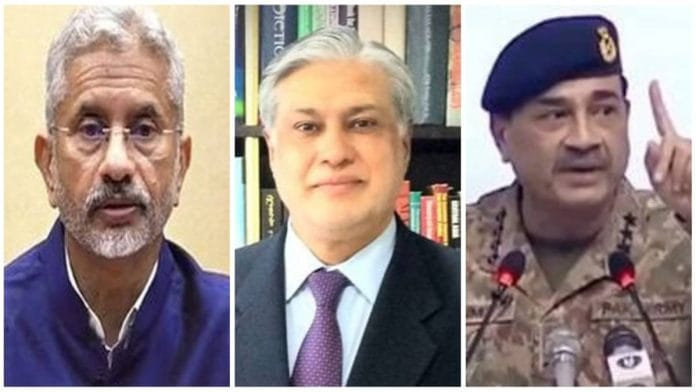New Delhi: The United States has stepped up its attempts to de-escalate the situation between India and Pakistan after Islamabad launched an offensive early Saturday that New Delhi has termed “escalatory”. Marco Rubio, US Secretary of State, spoke with External Affairs Minister S. Jaishankar, and Pakistan’s Army Chief General Asim Munir and Foreign Minister Ishaq Dar.
Rubio’s message to all three officials was to “de-escalate” and “re-establish” direct communication to avoid any miscalculation. Saturday was Rubio’s second talk with Jaishankar since Thursday, and his first with the military leadership in Pakistan. Rubio had also spoken to Prime Minister of Pakistan Shehbaz Sharif Thursday.
Jaishankar told Rubio, who is also US interim National Security Adviser (NSA), that India’s response has always been “measured and responsible”.
“Secretary of State Marco Rubio spoke with Indian External Affairs Minister Subrahmanyam Jaishankar. Secretary Rubio emphasised that both sides need to identify methods to de-escalate and re-establish direct communication to avoid miscalculation. He further proposed US support in facilitating productive discussions to avert future disputes,” Tammy Bruce, spokesperson for the US Department of State, said in a statement.
Rubio’s first call Saturday morning was with General Munir, followed by one with Dar. In both talks, Rubio offered US assistance in “starting constructive talks in order to avoid future conflicts”.
The conversations between Rubio and the Pakistani dispensation came after Islamabad early Saturday launched Operation Bunyan un Marsoos, targeting civilian and military infrastructure in Jammu & Kashmir and Punjab. The Ministry of Defence Friday evening said that drones were sighted at 26 locations along the International Border and Line of Control.
India sustained limited damage to equipment and personnel at air force stations in Udhampur, Pathankot, Adampur and Bhuj. Pakistan also targeted civilian infrastructure, attacking school and medical facilities at the air bases in Srinagar and Awantipur, the defence ministry said in a briefing.
“Secretary of State Marco Rubio spoke with Pakistani Deputy Prime Minister/Foreign Minister Ishaq Dar. Secretary Rubio reiterated that both parties must find ways to de-escalate the current situation and re-establish direct communication to avoid miscalculation. He also offered US assistance in starting constructive talks in order to avoid future conflicts,” Bruce said on Rubio’s talk with Dar.
Rubio has been US’ point-person since tensions escalated between India and Pakistan following the 22 April terrorist attack in Jammu & Kashmir’s Pahalgam, which left 26 people dead.
He spoke with Sharif twice, once at the end of April and then Thursday, calling on him to condemn the terrorist attack as well as take “concrete steps” to end support for “any” terrorist groups.
On 7 May, India launched Operation Sindoor, striking at nine terrorist complexes in Pakistan and Pakistan-occupied-Kashmir.
Wing Commander Vyomika Singh, during a special briefing Saturday morning, said Pakistan’s military was moving its troops into forward areas “indicating offensive intent to further escalate the situation”.
“Indian armed forces remain in a high state of operational readiness… Indian armed forces reiterate their commitment to non-escalation provided it is reciprocated by the Pakistan military,” she said.
Both Jaishankar and Foreign Secretary Vikram Misri have made it clear that any military action by Pakistan will be responded to suitably, emphasising that India’s actions during Operation Sindoor were non-escalatory, measured, proportionate and responsible.
(Edited by Nida Fatima Siddiqui)






